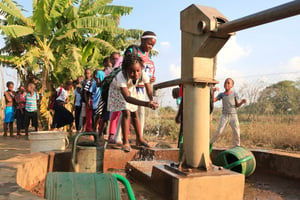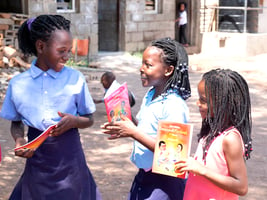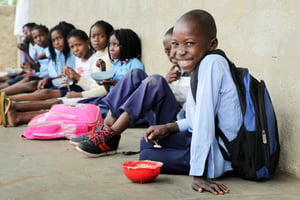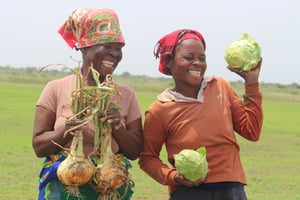Food for Knowledge: A Foundation for the Future
Planet Aid's flagship school feeding project, Food for Knowledge (FFK), comes to a close in 2020, after eight years and over 76 million meals distributed in Mozambique's Maputo province. The project's achievements in nutrition, education, and sustainable school feeding will positively impact communities well into the future.
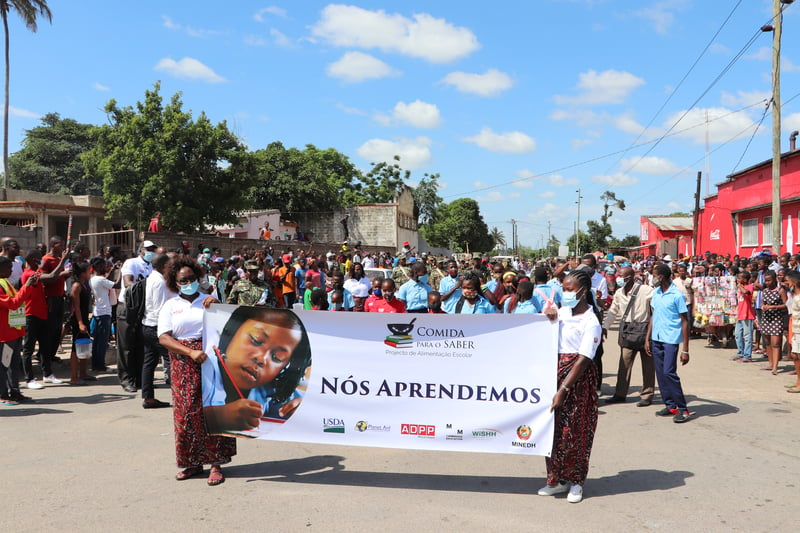
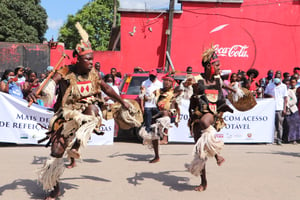
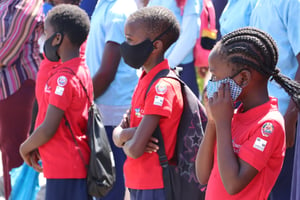
The FFK closing ceremony in Maputo on Dec.16 engaged communities through a local parade, traditional dance, and personal testimonies from the government, partners, and beneficiaries.
Located in Southern Africa and bordered to its east by the Indian Ocean, Mozambique is a complex nation with a variety of factors challenging its macroeconomic stability, including, at the most basic level, lack of quality education and health services. That's where Food for Knowledge (FFK) stepped in back in 2012.
Funded by the U.S. Department of Agriculture as part of the McGovern-Dole International Food for Education and Child Nutrition Program, FFK provided daily meals to students, established school gardens, trained teachers, built and refurbished school kitchens and latrines, and taught children to read in their local languages. Implemented from 2012 to 2020 by Planet Aid's partner ADPP Mozambique, the project served 271 primary schools throughout the Manhiça, Magude, Matutuíne, and Moamba districts. The support of Mozambique's Ministry of Education and Human Development (MINEDH) at district, provincial and national levels helped ensure the long-term sustainability of project impacts locally and nationally.
"The heart and soul of the program has always been schools, communities, teachers and students who participated daily in learning new skills, taking on new responsibilities and contributing their strength and energy to reach the program's goals," said Marie Lichtenberg, Planet Aid Director of International Partnership, in her virtual speech at FFK's closing ceremony in Maputo on Dec. 16.
Learning and nutrition go hand in hand. With the support of 3,500 volunteers, FFK directly helped more than 90 thousand children through the distribution of more than 76 million meals with approximately 7 million tons of corn flour and fortified soybeans (CSB +) produced by U.S. farmers. As a result of improved nutrition, reliable sustenance, and deworming, 99 percent of all enrolled students (as of the last quarter of 2019) attended class regularly, which has allowed FFK's educational interventions to have maximum impact.
The project's investment in school gardens provided an effective platform for nutritional education of students and communities, supported by the American Soybean Association's WISHH program, and demonstrated the successful production of local food to complement school feeding programs. In particular, eight large gardens, two in each district, increased production over the course of the project to supplement diets, distribute to communities, and generate income. The management of these gardens by community members was formalized at the end of the project to support their continued success.
FFK's bilingual literacy program emerged in the second phase of the project (2015-2020) to serve as a model for bilingual education nationwide. In partnership with Cambridge Education, FFK worked with MINEDH to develop quality academic materials and curricula for Portuguese and bilingual instruction, which can be utilized and replicated by MINEDH and other partners to scale up the programs and their impact nationwide. Children participating in the program at FFK schools demonstrated a keen ability to recognize letter sounds and impressive reading comprehension, outperforming the control group in reading individual words by nearly 250 percent.
FFK additionally supported the graduation of more than 13,000 new primary school teachers from ADPP's teacher training colleges (TCCs), permanent brick-and-mortar structures throughout the country. Graduates are employed in government schools throughout Mozambique, lowering teacher-student ratios and improving learning outcomes for an estimated 1 million students over the course of their teaching careers.
Throughout the project, FFK worked as a key partner with MINEDH and school feeding implementers to advance the expansion of the national school feeding program, PRONAE. A critical milestone was achieved in 2020 with the formation of a formal coordination platform of partners, donors, and the government to advance a national school feeding law and a dedicated line item for school feeding in the national budget.
In the closing ceremony on Monday, the governor of Maputo province, Júlio Paruque, applauded the Government of Mozambique for seeking support to facilitate social and economic development and praised FFK for helping reduce the school dropout rate by 50 percent in the last three years while increasing school enrollment. The event engaged surrounding communities through a local parade, traditional dance, and personal testimonies from the government, partners, and beneficiaries.
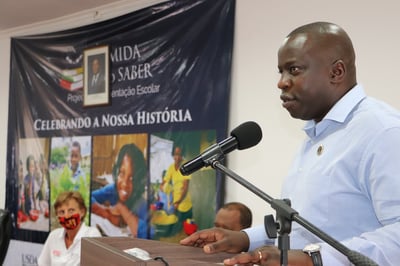
Governor of Maputo Province, Júlio Paruque
Although FFK has come to an end, it stands out as the epitome of cross-continental collaboration, demonstrating the power of teamwork and a shared passion to improve the basic human conditions in health and education. The FFK spirit will remain, with the continued participation of the Mozambican government, in the schools and communities. FFK has formed a strong foundation for local action and ownership, which will continually improve learning outcomes, local food production, and a better school environment for all.
Planet Aid's special YouTube video list documents the Food For Knowledge journey.
For a visual look back at this impactful project, view our memory book:
"Food for Knowledge: Celebrating Our Story."
